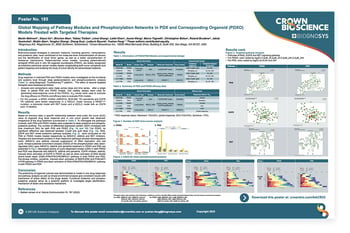- Our Services
- Platforms
- Target Solutions
- Technologies
- Service Types
- Our Science
- About Us
- Contact us
Martin Mehnert1*, Xiaoxi Xu2*, Binchen Mao2, Tobias Treiber1, Limei Shang2, Leilei Chen2, Jessie Wang2, Marco Tognetti1, Christopher Below1, Roland Bruderer1, Jakob Vowinckel1, Wubin Qian2, Yanghui Sheng2, Sheng Guo2, Ludovic Bourré2, Yuehan Feng1. *These authors contributed equally
1Biognosys AG, Wagistrasse 21, 8952 Schlieren, Switzerland;
2Crown Bioscience Inc., 16550 West Bernardo Drive, Building 5, Suite 525, San Diego, CA 92127, USA

Multi-omics-based strategies in precision medicine, including genomic, transcriptomic and proteomic data, have contributed to the molecular-level characterization of cancers and the identification of novel driver genes, as well as a better comprehension of resistance mechanisms. Patient-derived tumor models, including patient-derived xenograft (PDX) and in vitro 3D organoid counterparts (PDXO), are widely recognized as predictive preclinical cancer models closely recapitulating both tumor complexity and patient response and enabling the study of tumor identity for personalized medicine
Your privacy is important to us.
We'll never share your information.
© 2025 Crown Bioscience. All Rights Reserved.
Privacy Policy | Imprint | Terms of Service | Privacy Preferences


© 2025 Crown Bioscience. All Rights Reserved. Privacy Policy
2023-05-29
2023-04-03
landing_page
AACR 2023